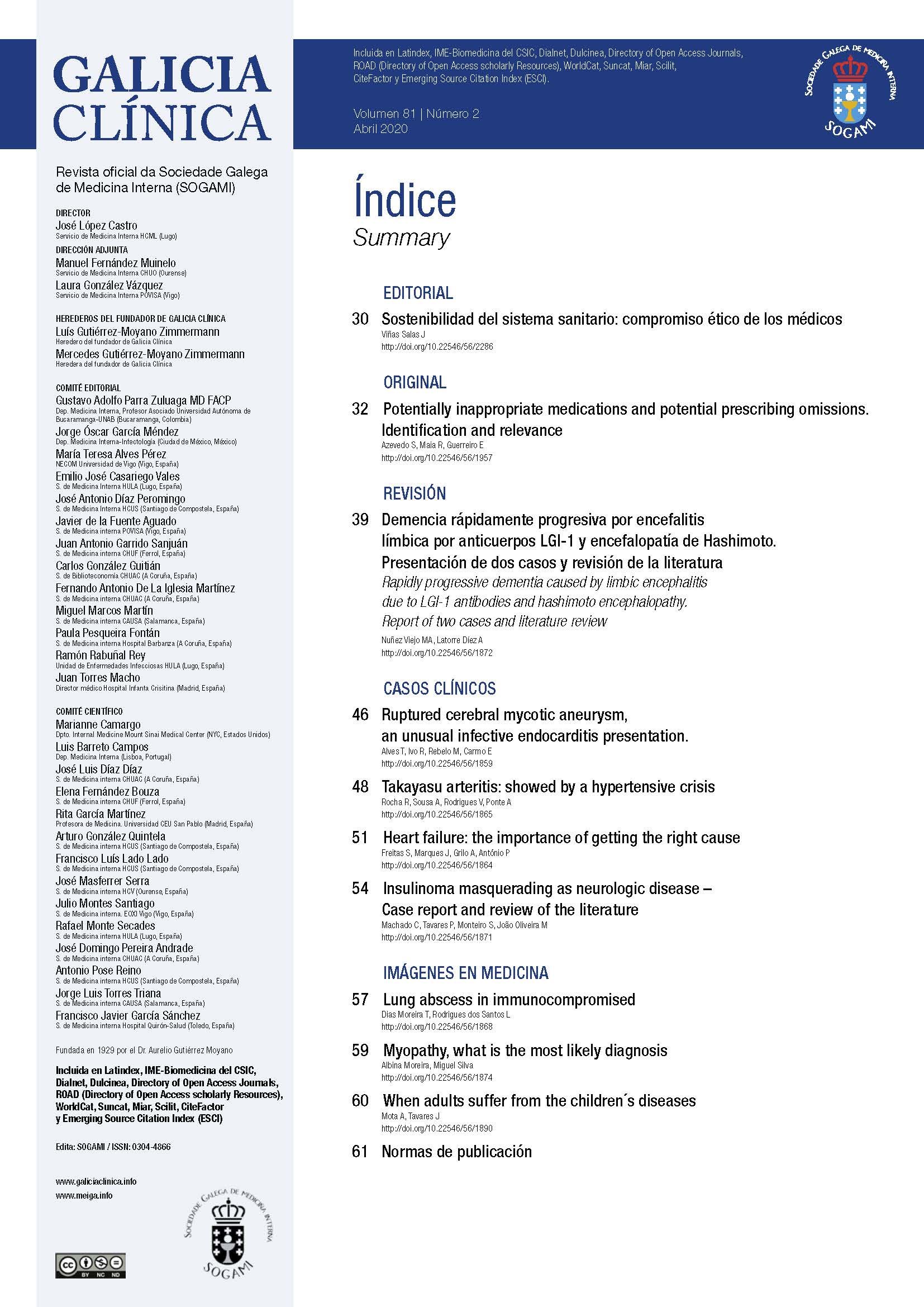Galicia Clínica by Sociedad Gallega de Medicina Interna is licensed under a Creative Commons Reconocimiento-NoComercial-SinObraDerivada 4.0 Internacional License.
Created from galiciaclinica.info.
Similar Articles
- Ignacio Lasierra Lavilla, Julien Paola Caballero Castro, Daniel Rubio Castro, Juana Maria Vicario Bermúdez, Ángel Jesús Castillejo Domínguez, Cristina Gargallo Martínez, Takayasu's disease: case series , Galicia Clínica: Vol. 84 No. 3 (2023): Galicia Clinica - Official Journal of the SOGAMI
- Joana Diogo, Carolina Coelho, Rita Monteiro, Ângela Ghiletchi, Vasculitis IgA que afecta a cuatro sistemas , Galicia Clínica: Vol. 83 No. 4 (2022): Galicia Clinica - Official Journal of the SOGAMI
- Joana Oliveira, Rodolfo Gomes, Large gouty tophi , Galicia Clínica: Vol. 80 No. 2 (2019): Galicia Clinica - Official Journal of the SOGAMI
- C Casar, Arteritis de Takayasu: una enfermedad sistémica desafiante , Galicia Clínica: Vol. 84 No. 3 (2023): Galicia Clinica - Official Journal of the SOGAMI
- Márcia Cravo, Daniela Barroso, Fabienne Gonçalves, Scleroderma renal crisis: a rare life-threatening cause of hypertension , Galicia Clínica: Vol. 82 No. 3 (2021): Galicia Clinica - Official Journal of the SOGAMI
- Verónica Guiomar, Luís Mendonça, Fatal skin ulcer in a patient on hemodialysis after renal allograft failure , Galicia Clínica: Vol. 82 No. 1 (2021): Galicia Clinica - Official Journal of the SOGAMI
- Flávia Santos, Ana Luísa Albuquerque, Patrícia Pereira, Emphysematous pyelonephritis , Galicia Clínica: Vol. 83 No. 4 (2022): Galicia Clinica - Official Journal of the SOGAMI
- Catarina Cascais Costa, Cláudia Rosado, By a thread , Galicia Clínica: Vol. 82 No. 3 (2021): Galicia Clinica - Official Journal of the SOGAMI
- Sara Pinto, Leonor Naia, Gilberto Teixeira, Margarida Eulálio, Synchronous Oligometastatic Lung Acinar Adenocarcinoma and Clear Cell Renal Cell Carcinoma: A case report , Galicia Clínica: Vol. 81 No. 1 (2020): Galicia Clinica - Official Journal of the SOGAMI
- Tiago Costa, Luís Rocha, Luciana Silva, Inês Rato, Sara Pinto, Disseminated nocardiosis - A case report , Galicia Clínica: Vol. 85 No. 3 (2024): Galicia Clinica - Official Journal of the SOGAMI
You may also start an advanced similarity search for this article.
Most read articles by the same author(s)
- Adriana Bandeira, Miguel Gonzalez Santos, Behnam Moradi, Alcina Ponte, Paula Costa, Refractory genetic hypokalemia in adulthood , Galicia Clínica: Vol. 83 No. 4 (2022): Galicia Clinica - Official Journal of the SOGAMI
- Filipa Amado, Pedro Tavares, Carla Falcão, Alcina Ponte, Whipple´s Disease and its challenging diagnosis , Galicia Clínica: Vol. 82 No. 2 (2021): Galicia Clinica - Official Journal of the SOGAMI


